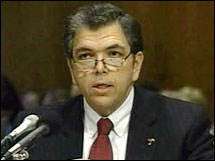|
Citigroup: Still looking for love CEO Chuck Prince's more conservative strategy is winning over some analysts - but investors aren't buying it, yet. NEW YORK (CNNMoney.com) -- Citigroup Chairman and CEO Charles Prince just can't seem to get any love from investors. Investor skittishness has plagued the stock of the nation's biggest bank since former CEO Sanford Weill - known for his growth-at-all-cost management style - handed over the reigns to the far more conservative Prince in mid-2003.
Citigroup (down $1.18 to $46.40, Charts) stock climbed to a high of $53 in April of 2004 but has traded in a narrow range since then as Wall Street takes measure of Prince's brand of leadership: focusing on organic growth, instilling a rigid ethics system and selling off non-core businesses. But some analysts are saying now's the time to give Citigroup another look. "Among the big banks, we would argue that Citigroup has the most advantages," said Dick Bove, analyst at Punk, Ziegel & Co. in a recent research note. "The bank is now well run. The [corporate raids] created by Sandy Weill and his crew are over." Management has focused on building businesses and retail branches that are the most profitable, global expansion and improved technology - all areas that warrant attention from Wall Street, Bove said. Still a tough sell But convincing investors isn't easy and hiccups in quarterly results continue to roil the stock - note Monday's 2 percent drop after Citigroup said earnings from continuing operations jumped 11 percent to about $5.3 billion, or $1.05 a share, but missed average forecasts by a penny a share. Revenue also came in shy of estimates. Citigroup executives tried to reassure investors, noting the company spent heavily on opening branches in the quarter. Citi expects to open a total of 1,000 branches by the end of the year. And they noted that trading and investment banking results continued to shine despite weaker global markets. But investors are still questioning Prince's slow-and-steady style, which seems at odds with Citigroup's reputation as an aggressive, risk-taker in the market. The risk-taking also led to some run-ins with regulators both in the U.S. and abroad. Prince was called upon to clean up Citigroup's tarnished reputation after the scandals at Enron and WorldCom cost the company $4 billion to settle shareholder lawsuits. And Prince repaired Citigroup's relationship with Japan's regulators who shut Citi's private banking unit as evidence emerged of securities violations. Prince publicly bowed in apology for Citigroup's mistakes in Japan. While Prince was hailed for his dedication to corporate governance, Wall Street worried his new emphasis would hinder growth and curb risk-taking. Those worries grew as executives considered stars under Weill - chief operating officer Robert Willumstad and the head of Citgroup's global consumer business, Marjorie Magner, left - fueling speculation Prince was pushing out respected executives who disagreed with his new focus. Craig Woker, analyst at Morningstar Inc., conceded that he shared those concerns last year but has since changed his tune. "You're not seeing a lot of bureaucracy in Citigroup lately," Woker said. "People that are in charge are focused on getting their jobs done and everybody seems to be on the same page." He added that Prince's decision to focus on organic growth and shed businesses that were underperforming was a prudent move, especially in this market. Open to acquisitions But all that doesn't mean Citigroup is averse to acquisitions. Speaking to reporters Monday, financial chief Sallie Krawcheck said Citigroup is still looking for deals at the right price, particularly in the international market. Krawcheck said the temptation to buy is still part of the company's make-up, especially after the Fed lifted its ban on Citigroup's ability to make large acquisitions last spring. But she said she was proud the company was resisting that temptation in favor of its current strategy. "It would be human nature to want to buy something quickly to get back into the game," she said. "We love to do deals... [but] we want to have a company that is as good at organic growth as it is in acquisitions." Still, it's too early to put out a report card on Prince and his management team, said David Easthope, analyst at independent research and consulting firm Celent LLC. On the plus side, Prince has bolstered its core trading business, but on the minus side, emerging markets have been especially volatile, Easthope said. But he added that Prince's focus on international could bolster Citigroup's earnings in the long run. Speaking at Citigroup's second quarter earnings call, Prince remained cautiously optimistic about the company's capital markets business, although he said market volatility has put pressure on that unit. Financial Chief Krawcheck conceded that while there has been weakness in capital market volumes in July - ahead of the seasonal summer doldrums experienced by traders - she said "there is no panic on the part of individual investors." She added that equity and M&A deals in the pipeline are at record levels, although she said a sustained market downturn could impact those businesses and hit Citigroup's revenues down the road. Some analysts say that investors should shake off some of the skittishness and look for opportunities of their own in Citigroup stock. Morningstar's Woker, for example, said the company is fairly valued at $59, though it's trading near $46.50. "This stock has pretty good upside," he said. "I think it's a good place for investors." ------------------------------------------------------------------- Related: Prince: New online bank rocks Related: Check financial stocks |
|

